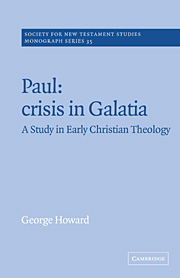Book contents
- Frontmatter
- Contents
- Preface to the first edition
- Preface to the second edition
- Introduction to the second edition
- Abbreviations
- 1 Paul's opponents in Galatia
- 2 Paul the apostle to the Gentiles
- 3 Justification by faith
- 4 Paul's view of the law
- Notes
- Bibliography
- Index of subjects and names
- Index of passages quoted
Preface to the first edition
Published online by Cambridge University Press: 22 September 2009
- Frontmatter
- Contents
- Preface to the first edition
- Preface to the second edition
- Introduction to the second edition
- Abbreviations
- 1 Paul's opponents in Galatia
- 2 Paul the apostle to the Gentiles
- 3 Justification by faith
- 4 Paul's view of the law
- Notes
- Bibliography
- Index of subjects and names
- Index of passages quoted
Summary
The present study is a re-evaluation of Paul's letter to the Galatians, and, with the exception of a few references to Romans, 1 Corinthians, and Acts, is confined almost exclusively to Galatians. This means that a great many problems in current New Testament studies, particularly those involving the relationship of Paul's letters with Acts, are avoided. This is the case for two reasons: (1) the issue of the relationship of Paul's letters with Acts takes us far beyond the scope of the present work and is reserved for a later time; (2) in the judgment of the writer many of the problems arising from this relationship are caused by a misunderstanding of Galatians. The present study aims at re-examining the traditional interpretations of this letter and proposes a re-interpretation of it. As a result a few suggestions for re-evaluating the relationship of Paul's letters with Acts are given; but these are only provisional and programmatic.
The title of the study, Paul: Crisis in Galatia. A Study in Early Christian Theology, indicates my method of approaching Pauline theology. It suggests that Paul's genius is seen best when his theology is allowed to arise from the historical setting of his struggles with opponents and his methods in preaching the gospel. An understanding of Paul's theology and biblical historical exegesis go hand in hand.
- Type
- Chapter
- Information
- Paul: Crisis in GalatiaA Study in Early Christian Theology, pp. ix - xPublisher: Cambridge University PressPrint publication year: 1990



